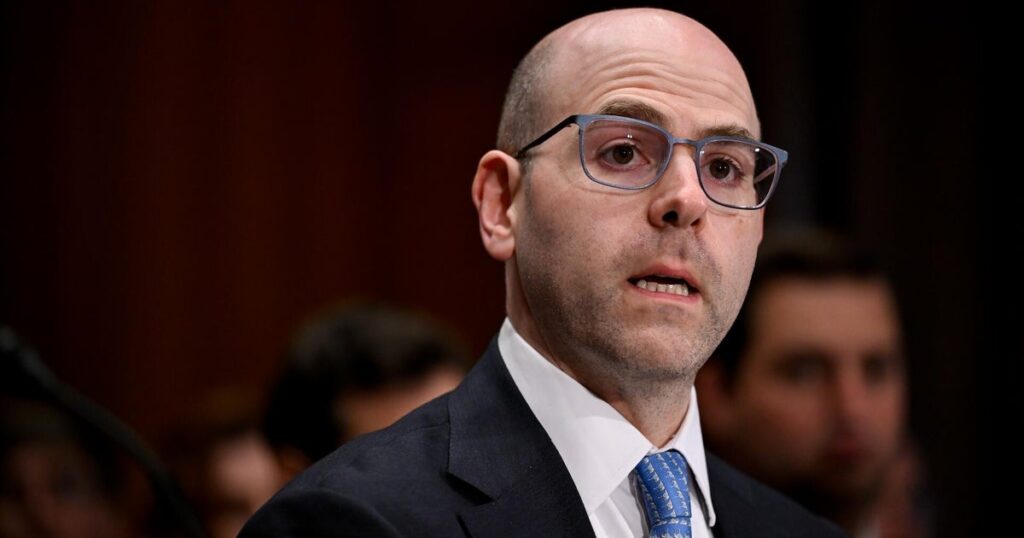On Monday, the Senate confirmed economist and advisor to former President Trump, Stephen Miran, to the Federal Reserve’s Board of Governors, a significant move that enhances Trump’s influence over the central bank. Miran’s confirmation, which passed by a narrow 48-47 vote, comes as the Federal Open Market Committee prepares to hold a crucial meeting to address potential adjustments to interest rates. His appointment arrives amid concerns over the independence of the Fed and its ability to conduct monetary policy free from political pressure.
| Article Subheadings |
|---|
| 1) Confirmation Process and Implications |
| 2) Concerns Regarding Fed Independence |
| 3) The Upcoming Federal Open Market Committee Meeting |
| 4) Political Reactions to Miran’s Nomination |
| 5) Future Considerations for the Federal Reserve |
Confirmation Process and Implications
On Monday, the Senate confirmed Stephen Miran to the Federal Reserve’s Board of Governors. This confirmation is pivotal as it provides former President Trump, who has previously criticized Fed officials for not cutting interest rates, greater influence over the central bank’s operations. The 48-47 confirmation was a close vote, highlighting the divided opinions among Senate members regarding the Fed’s direction and its independence. This appointment fills a vacancy left by Adriana Kugler, a Biden appointee, who stepped down last month, creating a need for a new member to ensure continuity in the Fed’s governance.
Concerns Regarding Fed Independence
The confirmation of Stephen Miran has raised significant concerns about the independence of the Federal Reserve. Critics, including Senate Banking Committee members, have questioned whether Miran will prioritize the central bank’s regulatory responsibilities over political influences. Elizabeth Warren, a prominent Democrat on the committee, has voiced her skepticism, stating that Miran’s dual roles could undermine his credibility and the Fed’s autonomy. She accused the former president of attempting to seize control over the Fed by allowing Miran to maintain his position in the White House’s Council of Economic Advisers while serving on the Fed Board.
The Upcoming Federal Open Market Committee Meeting
Miran’s confirmation comes just in time for the Federal Open Market Committee (FOMC) meeting scheduled for Tuesday and Wednesday. The FOMC, which comprises 12 top officials from the Federal Reserve, is set to discuss monetary policy, predominantly focusing on whether to cut the Fed’s target interest rate. Onlookers expect a rate reduction, largely due to the ongoing pressures on the economy, which has prompted discussions around stimulus measures to support growth. Having Miran in attendance may add weight to the discussions, as he aligns with Trump’s pro-rate cut sentiment advocated for a boost in economic growth.
Political Reactions to Miran’s Nomination
The Senate Banking Committee’s decision to advance Miran’s nomination garnered mixed responses from senators. While Republican members praised Miran’s extensive experience and leadership capabilities, Democrats expressed concerns regarding the implications of a political appointee’s influence over monetary policy. Tim Scott, the committee chair, defended Miran’s qualifications, emphasizing the need for steady leadership within the Fed to maintain economic stability. The divergent views exemplify the polarized nature of politics surrounding critical financial institutions in the U.S.
Future Considerations for the Federal Reserve
The appointment of Stephen Miran is part of a broader strategy by the Trump administration to reshape the Federal Reserve. His confirmation comes alongside other appointments and potential dismissals, including Lisa Cook, who is facing legal challenges regarding her position. The president’s influence can alter the composition of the Fed significantly; if he successfully replaces both Cook and Powell, he may gain control over five of the seven board seats. Such a shift could have profound implications for U.S. monetary policy, potentially intertwining more closely with political objectives.
| No. | Key Points |
|---|---|
| 1 | Senate confirms Stephen Miran to the Federal Reserve, enhancing Trump’s influence. |
| 2 | Concerns arise about the potential erosion of the Fed’s independence. |
| 3 | Key meeting of the Federal Open Market Committee to discuss interest rate cuts. |
| 4 | Mixed political reactions reveal a divided Senate on monetary policy influence. |
| 5 | Potential future changes in Fed composition could reshape U.S. monetary policy. |
Summary
The confirmation of Stephen Miran to the Federal Reserve’s Board of Governors signifies a crucial moment in U.S. monetary policy and political maneuvering. As the Fed prepares for potentially transformative decisions in the coming days, the implications of Miran’s appointment and his relationship with the former president raise questions about the future independence of the central bank.
Frequently Asked Questions
Question: Who is Stephen Miran?
Stephen Miran is an economist and former advisor to President Trump who has been appointed to the Federal Reserve’s Board of Governors.
Question: What concerns did Democrats raise regarding Miran’s appointment?
Democrats, particularly Elizabeth Warren, expressed concerns that Miran’s dual role could undermine the independence of the Federal Reserve and give political leaders undue influence over monetary policies.
Question: What is the relevance of the upcoming FOMC meeting?
The upcoming Federal Open Market Committee meeting is crucial as it will address potential changes to the Fed’s target interest rate, which many observers anticipate might be lowered to stimulate economic growth.


